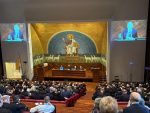Mumbai: St Pius X College, the seminary of the archdiocese of Bombay, is all set to stage a play in Hindi on Blessed Oscar Romero of El Salvador, who was shot dead while celebrating Mass in 1980.
“Oscar Romero and Jesus of Nazareth had many similarities,” says Father Nigel Barrett, spokesman for the archdiocese of Bombay explaining the reason for the major seminary to stage “’Nirnayon ka Jeevan (A Life of Decisions)’ during the birth centenary year of the El Salvadorian prelate.
According to the Mumbai priest, both Jesus and Romero were born in abject poverty, in a small and insignificant country.
“Both learned the trade of carpentry. They lived a life of profound intimacy with God, often praying all night. After the killing of a close and dear friend (John the Baptist and Rutilio Grande), they both began their public ministry of preaching, proclaiming the Good News and announcing a new order, the Kingdom of God among all the people. Jesus and Oscar always took the side of the poor, the socially excluded and because of this all important officials were against them. Most poignantly, with their horrific deaths, their public ministry lasted only three years,” Father Nigel said.
Archbishop Romero was active in Central America during the 1970s and 80s, The Times of India reports.
He was born on August 15, 1917.He made decisions that led him to the seminary to become a priest. His further decisions led him to his ordination to the priesthood. For 23 years as Father Romero faithfully served in the town of San Miguel, Father Nigel said.
“He was loved by the rich and poor although he would use his influence with the rich to help the poor. Then he was ordained a bishop, and for seven years he continued to be directly involved with the people and their problems, while he endeavored as the Secretary-General of the National and Central American Bishops’ Conferences.”
The Church of El Salvador, and indeed of the whole of Central America, underwent a significant transformation after Vatican II and the 1967 meeting of the Latin American Bishops’ Conference in Medellin.
Bishops started directly participating in the lives of the poor. They sent their priests to work for them and liberate them from social evils and injustices. They formed Small Christian Communities and began teaching unlettered people about human and political rights.
The government considered all this as Communism and gradually the Church and its priests came under a lot of persecution. As for Bishop Oscar Romero, until 1977 he felt that the Church must never get involved in politics or be at odds with the government; rather they should stick to a mere spiritual function.
Fr Nigel says all this changed only three weeks after he was appointed the Archbishop of El Salvador. While his appointment itself was done so that Romero could control and put a handle on his priests, it turned out that the new archbishop would do something even more revolutionary, just as Jesus had done in Israel.
He said many still believe that Oscar Romero’s death was in vain since the situation in El Salvador has not changed appreciably to this day. “But then again, they said this about the life and death of Jesus of Nazareth too. We leave that decision up to you,” Fr Nigel added.
Archbishop Romero served as the fourth Archbishop of San Salvador. In 1980, Romero was assassinated while offering Mass in the chapel of the Hospital of Divine Providence.
Pope Francis stated during Romero’s beatification that “His ministry was distinguished by his particular attention to the most poor and marginalized.” The supporters of liberation theology hailed him a hero. His biographer notes that the prelate was not interested in liberation theology but he had faithfully adhered to Catholic teachings on liberation and a preferential option for the poor, desiring a social revolution based on interior reform.
Up to the end of his life, his spiritual life drew much from the spirituality of Opus Dei. While seen as a social conservative at his appointment as archbishop in 1977, he was deeply affected by the murder of his friend and fellow priest Jesuit Father Rutilio Grande a few weeks after his own appointment and subsequently developed into an outspoken social activist.
In 2010, the United Nations General Assembly proclaimed March 24 as the “International Day for the Right to the Truth Concerning Gross Human Rights Violations and for the Dignity of Victims” in recognition of the role of Archbishop Romero in defense of human rights.
Romero actively denounced violations of the human rights of the most vulnerable people and defended the principles of protecting lives, promoting human dignity and opposition to all forms of violence.









